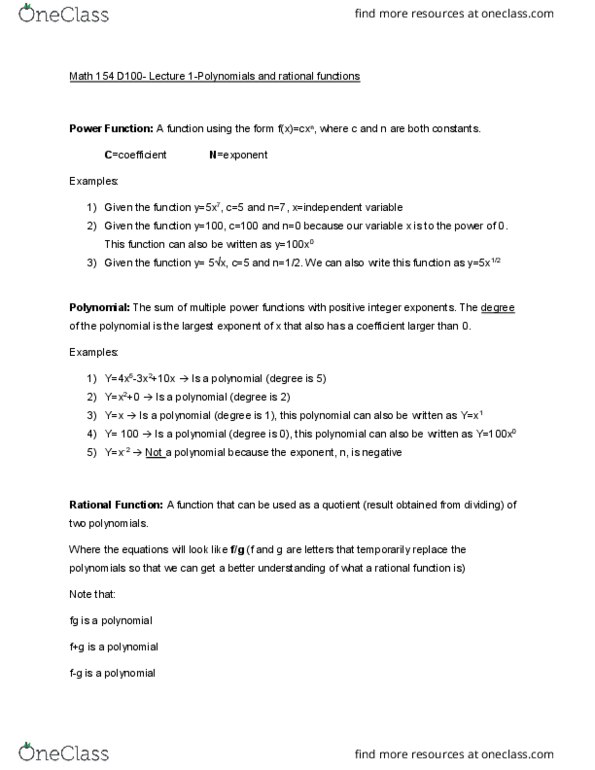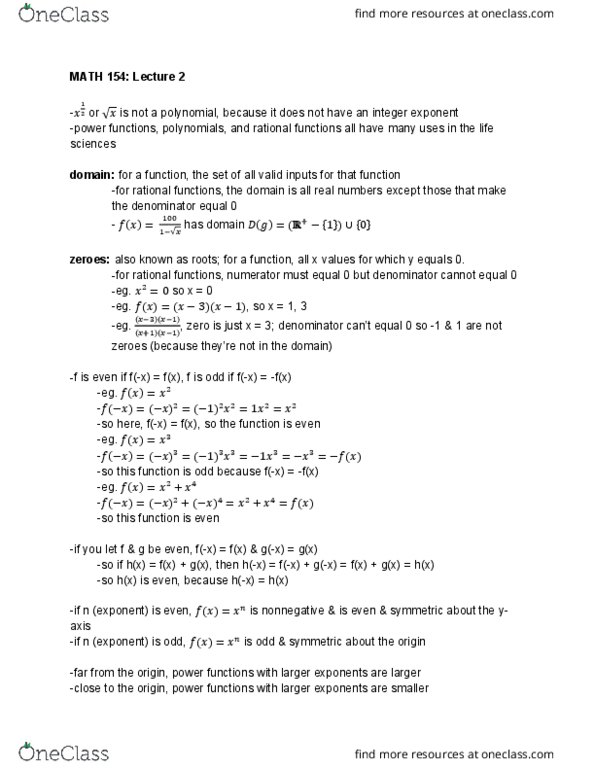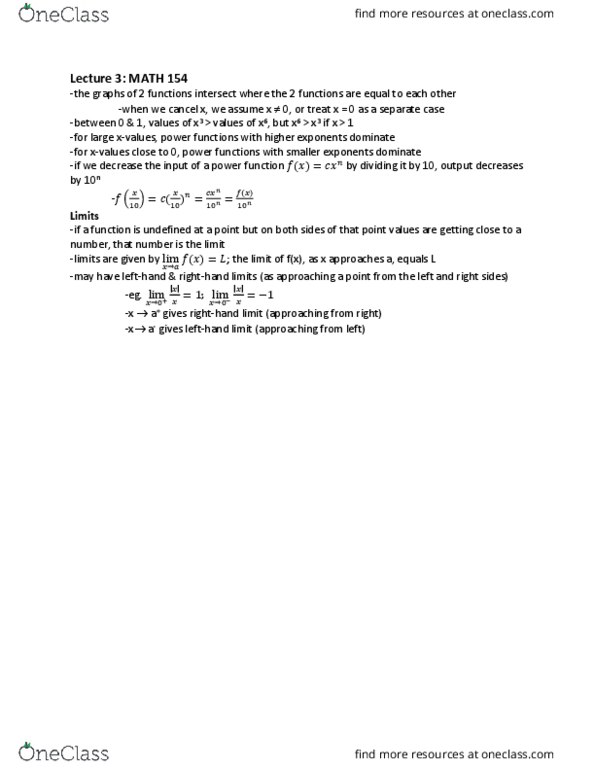Q1. Determine, without graphing, whether the quadratic function f(x) = x2 + 2x - 6 has a maximum value or a minimum value and then find that value. a. minimum; -7 b. minimum; -1 c. maximum; -1 d. maximum; -7 Q2. Find (f - g)(4) when f(x) = 5x2 + 6 and g(x) = x + 2. a. 80 b. 88 c. 84 d. -90 Q3. The graph of a function is given. Decide whether it is even, odd, or neither. a. even b. odd c. neither Q4. Find the average rate of change for the function f(x) = -3x2 - x from the values 5 to 6. a. 1/2 b. -2 c. -34 d. -1/6 Q5. Find the vertex and axis of symmetry of the graph of the function f(x) = 3x2 + 36x. a. (-6, -108); x = -6 b. (-6, 0); x = -6 c. (6, -108); x =6 d. (6, 0); x = 6 Q6. The graph of a function is given. Decide whether it is even, odd, or neither. a. even b. odd c. neither Q7. Use the graph to find the intervals on which it is increasing, decreasing, or constant. a. Increasing on (-3, -2) and (2, 4); decreasing on (-1, 1); constant on (-2, -1) and (1, 2) b. Decreasing on (-3, -2) and (2, 4); increasing on (-1, 1); constant on (-2, -1) and (1, 2) c. Decreasing on (-3, -2) and (2, 4); increasing on (-1, 1) d. Decreasing on (-3, -1) and (1, 4); increasing on (-2, 1) Q8. Graph the function F(x) = -5. State whether it is increasing, decreasing, or constant. a. b. c. d. Q9. Determine algebraically whether f(x) = -2x3 is even, odd, or neither. a. even b. odd c. neither Q10. Find the average rate of change for the function f(x) = 3/(x - 2) from the values 4 to 7. a. 7 b. 1/3 c. -3/10 d. 2 Q11. For the graph of the function y = f(x), find the absolute maximum and the absolute minimum, if it exists. a. Absolute maximum: f(4) = 7; Absolute minimum: f(1) = 2 b. Absolute maximum: f(4) = 7; Absolute minimum: none c. Absolute maximum: none; Absolute minimum: none d. Absolute maximum: none; Absolute minimum: f(1) = 2 Q12. The graph of a function f is given. Find the numbers, if any, at which f has a local minimum. What are the local minima? a. f has a local minimum at x = -2; the local minimum is 0 b. f has a local minimum at x = 0; the local minimum is 3 c. f has a local minimum at x = -2 and 2; the local minimum is 0 d. f has no local minimum Q13. Graph the function h(x) = -2x + 3. State whether it is increasing, decreasing, or constant. a. b. c. d. Q14. Find -f(x) when f(x) = -2x2 + 5x + 2. a. 2x2 - 5x + 2 b. -2x2 - 5x - 2 c. -2x2 - 5x + 2 d. 2x2 - 5x - 2 Q15. Determine algebraically whether f(x) = 1/x2 is even, odd, or neither. a. even b. odd c. neither Q16. Match the graph to one of the listed functions. a. f(x) = x2 - 8 b. f(x) = -x2 - 8x c. f(x) = x2 - 8x d. f(x) = -x2 - 8 Q17. In a certain city, the cost of a taxi ride is computed as follows: There is a fixed charge of $2.90 as soon as you get in the taxi, to which a charge of $1.70 per mile is added. Find an equation that can be used to determine the cost, C(x), of an x-mile taxi ride. a. C(x) = 1.70 + 2.90x b. C(x) = 3.10x c. C(x) = 4.60x d. C(x) = 2.90 + 1.70x Q18. Graph the function f(x) = -x2 + 3 by starting with the graph of y = x2 and using transformations (shifting, compressing, stretching, and/or reflection). a. b. c. d. Q19. Graph the function f(x) = x2 + 8x + 7 using its vertex, axis of symmetry, and intercepts. a. b. c. d. Q20. Determine where the function f(x) = -x2 + 8x - 7 is increasing and where it is decreasing. a. increasing on (4, â) and decreasing on (-â, 4) b. increasing on (-â, 4) and decreasing on (4, â) c. increasing on (9, â) and decreasing on (-â, 9) d. increasing on (-â, 9) and decreasing on (9, â) Q21. Find the domain of the rational function f(x) = (x + 9)/(x2 - 4x). a. {x|x â -2, x â 2} b. {x|x â -2, x â 2, x â -9} c. all real numbers d. {x|x â 0, x â 4} Q22. For the polynomial f(x) = 4(x - 5)(x - 6)3, list each real zero and its multiplicity. Determine whether the graph crosses or touches the x-axis at each x-intercept. a. 5, multiplicity 1, touches x-axis; 6, multiplicity 3 b. -5, multiplicity 1, touches x-axis; -6, multiplicity 3 c. 5, multiplicity 1, crosses x-axis; 6, multiplicity 3, crosses x-axis d. -5, multiplicity 1, crosses x-axis; -6, multiplicity 3, crosses x-axis Q23. Find all zeros of the function f(x) = 2x4 + 3x3 + 16x2 + 27x - 18 and write the polynomial as a product of linear factors. a. f(x) = (2x - 1)(x + 2)(x + 3)(x - 3) b. f(x) = (2x + 1)(x - 2)(x + 3)(x - 3) c. f(x) = (2x - 1)(x + 2)(x + 3i)(x - 3i) d. f(x) = (2x + 1)(x - 2)(x + 3i)(x - 3i) Q24. For the polynomial f(x) = (1/5)x(x2 - 5), list each real zero and its multiplicity. Determine whether the graph crosses or touches the x-axis at each x-intercept. a. 0, multiplicity 1, touches x-axis; â5, multiplicity 1, touches x-axis; -â5, multiplicity 1, touches x-axis b. 0, multiplicity 1, crosses x-axis; â5, multiplicity 1, crosses x-axis; -â5, multiplicity 1, crosses x-axis c. â5, multiplicity 1, touches x-axis; -â5, multiplicity 1, touches x-axis d. 0, multiplicity 1 Q25. List the potential rational zeros of the polynomial function f(x) = x5 - 6x2 + 5x + 15. Do not find the zeros. a. ± 1, ± 1/5, ± 1/3 ± 1/15 b. ± 1, ± 5, ± 3, ± 15 c. ± 1, ± 5, ± 3 d. ± 1, ± 1/5, ± 1/3, ± 1/15, ± 5, ± 3,± 15 Q26. The function f(x) = x4 - 5x2 - 36 has the zero -2i. Find the remaining zeros of the function. a. 2i, 6, -6 b. 2i, 3i, -3i c. 2i, 3, -3 d. 2i, 6i, -6i Q27. Use transformations of the graph of y = x4 to graph the function f(x) = 5x4. a. b. c. d. Q28. State whether the function f(x) = x(x - 9) is a polynomial function or not. If it is, give its degree. If it is not, tell why not. a. Yes; degree 2 b. No; it is a product c. Yes; degree 0 d. Yes; degree 1 Q29. Solve the inequality algebraically. Express the solution in interval notation. (x - 2)2(x + 9) < 0 a. (-â, -9) or (9, â) b. (-â, -9] c. (-â, -9) d. (-9, â) Q30. Use the Intermediate Value Theorem to determine whether the polynomial function f(x) = -4x4 - 9x2 + 4; has a zero in the interval [-1, 0]. a. f(-1) = -9 and f(0) = -4; no b. f(-1) = 9 and f(0) = 5; no c. f(-1) = 9 and f(0) = -4; yes d. f(-1) = -9 and f(0) = 4; yes Q31. Use the Factor Theorem to determine whether x + 5 is a factor of f(x) = 3x3 + 13x2 - 9x + 5. a. Yes b. No Q32. Find a bound on the real zeros of the polynomial function f(x) = x4 - 8x2 - 9. a. -17 and 17 b. -9 and 9 c. -18 and 18 d. -10 and 10 Q33. Find the x-intercepts of the graph of the function f(x) = (x - 3)(2x + 7)/(x2 + 9x - 8). a. (3, 0), (-7, 0) b. (-3, 0), (7/2, 0) c. (3, 0), (-7/2, 0) d. none Q34. Solve the inequality algebraically. Express the solution in interval notation. (9x - 5)/(x + 2) ⤠8 a. (-2, 13] b. (-2, 21) c. (-2, 21] d. (-2, 13) Q35. A polynomial f(x) of degree 3 whose coefficients are real numbers has the zeros -4 and 4 - 5i. Find the remaining zeros of f. a. 4, -4 + 5i b. 4, 4 + 5i c. 4 + 5i d. -4 + 5i Q36. Find the intercepts of the function f(x) = x3 + 3x2 - 4x - 12. a. x-intercepts: -2, 2, 3; y-intercept: -12 b. x-intercepts: -3, -2, 2; y-intercept: -12 c. x-intercept: -3; y-intercept: -12 d. x-intercept: -2; y-intercept: -12 Q37. Find the real solutions of the equation 3x3 - x2 + 3x - 1 = 0. a. {-3, 1/3, -1} b. {1/3} c. {1/3, -1} d. {-3, -1/3, -1} Q38. Solve the inequality algebraically. Express the solution in interval notation. x3 ⥠27 a. (-â, 3] b. (-â, -3] ⪠[3, â) c. [-3, 3] d. [3, â) Q39. Find the intercepts of the function f(x) = x2(x - 1)(x - 6). a. x-intercepts: 0, -1, -6; y-intercept: 0 b. x-intercepts: 0, 1, 6; y-intercept: 6 c. x-intercepts: 0, 1, 6; y-intercept: 0 d. x-intercepts: 0, -1, -6; y-intercept: 6 Q40. Find the domain of the rational function R(x) = (-3x2)/(x2 + 2x - 15). a. {x|x â 5, 3} b. {x|x â 5, -3} c. {x|x â - 15, 1} d. {x|x â -5, 3}






